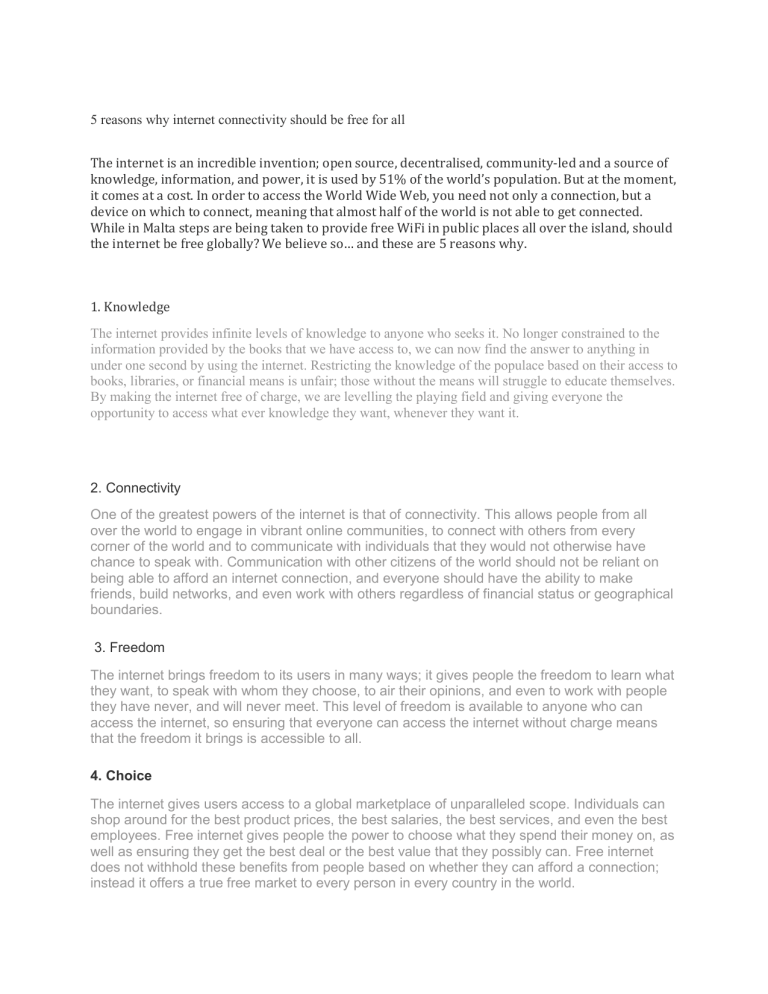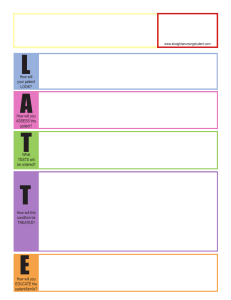
5 reasons why internet connectivity should be free for all The internet is an incredible invention; open source, decentralised, community-led and a source of knowledge, information, and power, it is used by 51% of the world’s population. But at the moment, it comes at a cost. In order to access the World Wide Web, you need not only a connection, but a device on which to connect, meaning that almost half of the world is not able to get connected. While in Malta steps are being taken to provide free WiFi in public places all over the island, should the internet be free globally? We believe so… and these are 5 reasons why. 1. Knowledge The internet provides infinite levels of knowledge to anyone who seeks it. No longer constrained to the information provided by the books that we have access to, we can now find the answer to anything in under one second by using the internet. Restricting the knowledge of the populace based on their access to books, libraries, or financial means is unfair; those without the means will struggle to educate themselves. By making the internet free of charge, we are levelling the playing field and giving everyone the opportunity to access what ever knowledge they want, whenever they want it. 2. Connectivity One of the greatest powers of the internet is that of connectivity. This allows people from all over the world to engage in vibrant online communities, to connect with others from every corner of the world and to communicate with individuals that they would not otherwise have chance to speak with. Communication with other citizens of the world should not be reliant on being able to afford an internet connection, and everyone should have the ability to make friends, build networks, and even work with others regardless of financial status or geographical boundaries. 3. Freedom The internet brings freedom to its users in many ways; it gives people the freedom to learn what they want, to speak with whom they choose, to air their opinions, and even to work with people they have never, and will never meet. This level of freedom is available to anyone who can access the internet, so ensuring that everyone can access the internet without charge means that the freedom it brings is accessible to all. 4. Choice The internet gives users access to a global marketplace of unparalleled scope. Individuals can shop around for the best product prices, the best salaries, the best services, and even the best employees. Free internet gives people the power to choose what they spend their money on, as well as ensuring they get the best deal or the best value that they possibly can. Free internet does not withhold these benefits from people based on whether they can afford a connection; instead it offers a true free market to every person in every country in the world. 5. People Power The internet is well-known as a platform where people can discuss issues, politics, society, economy, and other matters, as well as giving a platform for change-makers to flourish. If the internet is free, everyone in the world has an equal opportunity to have their voice heard, to educate themselves each other and to come together to fight for change, where change is needed. Free internet will also facilitate the sharing and development of ideas that range from technology to health, art to finance, and politics to sociology- all of these things are core parts of a functioning society and the internet is the perfect platform to allow people from all walks of life to meet and discuss in a virtual environment. Over the past three decades the global use of the Internet has risen exponentially, with billions connected and sharing images, posts, mails and stories. Like the invention of printing and eventually, the advent of the industrial revolution, the invention of the internet has disrupted human evolution and life will never be the same again. This technology has brought people closer and propelled an artistic, cultural and political revolution that is ongoing. Ultimately, free access to the internet ensures a fairer society, one where all enjoy unhindered access to knowledge and communications. No wonder the United Nations thinks internet access is a human right. President Obama went a step further and said that “the Internet is not a luxury, it is a necessity”. One can only hope that governments and business agree on how to make this fantastic and almost atomistic dream a reality.

